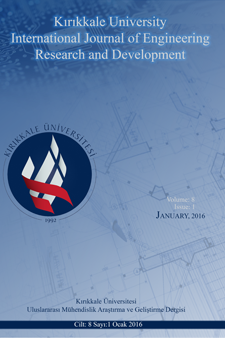Uçak İniş Takımının MR Damperle Yarı Aktif Kontrolünün Yapılması
Uçak iniş takımı titreşimleri, MR sönümleyici, pasif kontrol, yarı aktif kontrol
Semi-active Control of Landing Gear with MR Damper
___
- Wentscher, H., Kortüm, W., Krüger, W.R. (1996). “Fuselage vibration control using semi-active front gear” , The design, qualification and maintanence of vibration free landing gear, Advisory Group of Aeroscope Research and Development, pp. 5, 112, March.
- Kruger, W., Besselink, I., Cowling, D., Boan, D.B., Kortum, W., Krabacher, W. “Aircraft landing gear dynamics: simulation and control’’, Vehicle system dynamics: international journal of vehicle mechanics and mobility, 28:2-3, pp. 119-158, doi:10.1080/00423119708969352
- Wang, H., Xing, J., T., Price, W., G., Li, W. (2008). “An ınvestigation of an active landing gear system to reduce aircraft vibrations caused by landing impacts and runway excitation”, Journal of Sound and Vibration, 317, pp. 50-66.
- Sforza, P., M. (2014). “Commercial Airplane Design Principles”, Chapter 7, Landing Gear Design, pp. 251-300.
- Astori, P. (2009). “Numerical models for aircraft systems”, Chapter 5, Landing gear system. Polictecnico Di Milano.
- Zapateiro, M., Pozo, F., Rossell, J., M., Karimi, H., R., Luo, N. (2011). “Landing gear suspension control through adaptive backstepping techniques with H∞ performance”, International Federation of Automatic Control, pp. 4809-4814, Milano, Italy.
- Ghiringhelli, G. L. “Testing of a semi-active landing gear control for a general aviation aircraft”, Polictecnico Di Milano, Italy.
- Sivakumar, S., Haran, A.P. (2013). “Mathematical model and vibration analysis of aircraft with active landing gears”, Journal Of Vibration And Control, SAGE. doi: 10.1177/1077546313486908.
- Corsetti, C., D., Dillow, J., D. (1972). “A study of the practibility of active vibration ısolation applied to aircraft during the taxi condition”, Air Force Flight Dynamics Laboratory, Ohio, USA, July.
- Guclu, R., (2004). “Active suspension control of eight degrees of freedom vehicle model”, Mathematical & Computational Applications, Vol. 9, No.1, pp. 1-10.
- Jahromi, A., F., Gharapurkar, A., A., Xie, W., Bhat, R., B., “Semi-active control of aircraft landing gear system using Hinfinity control approach”.
- Paksoy, M., Guclu, R., Cetin, S. (2013). “MR damperli yarı-aktif taşıt modelinin bulanık mantık tabanlı kontrolü”, Otomatik Kontrol Ulusal Toplantısı, TOK2013, Malatya.
- Gharapurkar, A. A.,(2014). “Robust semi-active control of aircraft landing gear system equipped with magnetorheological dampers”, Master Thesis, Concordia University, Montreal, Quebec Canada.
- Paksoy, M., Guclu, R. (2013). “Taşıt titreşimlerinin MR sönümleyici ile yarı aktif bulanık kontrolü”, Yüksek Lisans Tezi, YTÜ, Fen Bilimleri Enstitüsü, İstanbul, Türkiye.
- Spencer Jr., B. F., Dyke, S.J., Sain., M.K., Carlson. J.D. (1997), “Phenomenological model of a Magnetorheological Damper”, Journal of Engineering Mechanics, ASCE, 123(3):230-238.
- Eligar, S., Banakar, R. M., (2014). “A model based approach for desıgn of semiactıve suspensıon usıng varıable structure control”, International Journal of Technical Research and Applications, www.ijtra.com Volume 2, e-ISSN: 2320-8163.
- Yayın Aralığı: 2
- Başlangıç: 2009
- Yayıncı: -
MC-CDMA Sistemlerinde Alt Taşıyıcı Tahsis Algoritmalarının Performanslarının İncelenmesi
Değer Akışı Haritalandırma Yöntemi: Mobilya Sektöründe Bir Uygulama
Ahmet DOĞAN, Ümit Sami SAKALLI
Uçak İniş Takımının MR Damperle Yarı Aktif Kontrolünün Yapılması
2014 Yılında Türkiye'de Meydana Gelen Ölümlü İş Kazalarının Analizi
